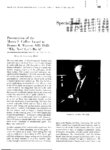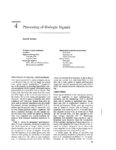Filters: Date: "1995" Collection: "ir_uspace"
| Creator | Title | Description | Subject | Date | ||
|---|---|---|---|---|---|---|
| 101 |
 |
Capecchi, Mario R. | Personal view of gene targeting | Gene targeting provides the means for creating strains of mice with mutations in virtually any gene.1 First, the desired mutation is introduced into a cloned copy of the chosen gene by standard recombinant DNA technology. The mutation is then transferred to the genome of a pluripotent mouse embryo-d... | 1995 | |
| 102 |
 |
Horch, Kenneth W. | Perspectives on new electrode technology for stimulating peripheral nerves with implantable motor prostheses | Abstract-The limits of present electrode technology are being reached in current motor prostheses for restoring functional movement in paralyzed people. Improved devices require electrodes and stimulation methods that will activate muscles selectively and independently with less implanted hardwa... | Paralysis; Prostheses; Electrodes | 1995 |
| 103 |
 |
Vardeny, Zeev Valentine | Photoresponse and electroresponse of polymers light emitting diodes | We have studied the photoresponse and electroresponse of light emitting diodes (LEDs ) made from a variety of soluble conducting polymers sandwiched between indium tin oxide (ITO) and metals including calcium, aluminum and copper. Under illumination all freshly prepared LEDs exhibit relatively large... | Photoresponse; Electroresponse; Photovoltage; I-V curves | 1995 |
| 104 |
 |
Stoller, Leigh B. | PPE interface and functional specification | This document describes the interface and functional specification of a Protocol Processing Engine (PPE) for workstation clusters. The PPE is intended to provide the support necessary to implement low latency protocols requiring only low resource (cpu and bus bandwidth) consumption. | Protocol Processing Engine; PPE; Workstation clusters | 1995 |
| 105 |
 |
Brunvand, Erik L. | Precise exception handling for a self-timed processor | Self-timed systems structured as multiple concurrent processes and communicating through self-timed queues are a convenient way to implement decoupled computer architectures. Machines of this type can exploit instruction level parallelism in a natural way, and can be easily modified and extended... | 1995 | |
| 106 |
 |
Clayton, Paul D. | Presentation of the Morris F. Collen Award to Homer R. Warner, MD, PhD: "Why Not! Let's Do It!" | Biomedical Informatics | 1995 | |
| 107 |
 |
Gardner, Reed M. | Processing Biologic Signals | Biomedical Informatics | 1995 | |
| 108 |
 |
Orr, Douglas B. | Program specialization using the OMOS system | Abstraction and modularity provide many software engineering benefits. Hiding details of module internals can, however, prevent system implementors from being able to provide anything but a highly general implementation of a given module. We describe OMOS, a programmable linker/loader and system s... | OMOS system; Program specialization; Modularity; Linker/loader; Modules | 1995 |
| 109 |
 |
Williams, Clayton C.; Huang, Yufeng | Quantitative two-dimensional dopant profile measurement and inverse modeling by scanning capacitance microscopy | Quantitative dopant profile measurements are performed on a nanometer scale by scanning capacitance microscopy (SCM). An atomic force microscope is used to position a nanometer scale tip at a semiconductor surface, and local capacitance change is measured as a function of sample bias. A new feedback... | Dopant profile; Capacitance change; Scanning capacitance microscopy; Feedback control | 1995 |
| 110 |
 |
Carter, John B. | Reducing consistency traffic and cache misses in the avalanche multiprocessor | For a parallel architecture to scale effectively, communication latency between processors must be avoided. We have found that the source of a large number of avoidable cache misses is the use of hardwired write-invalidate coherency protocols, which often exhibit high cache miss rates due to exces... | Consistency traffic; Cache misses; Parallel architecture; Communication latency | 1995 |
| 111 |
 |
Kestle, John R. W. | Reduction of hemorrhage risk after stereotactic radiosurgery for cavernous malformations | The benefits of radiosurgery for cavernous malformations are difficult to assess because of the unclear natural history of this vascular lesion, the inability to image malformation vessels, and the lack of an imaging technique that defines "cure." The authors selected for radiosurgery 47 patients w... | Cavernous malformation; Gamma knife; Stereotactic radiosurgery | 1995 |
| 112 |
 |
Kestle, John R. W. | Relationship of intraoperative electrophysiological criteria to outcome after selective functional posterior rhizotomy | At British Columbia's Children's Hospital, the criteria used in selective functional posterior rhizotomy (SFPR) evolved in three distinct phases. In Phase 1 the electrophysiological criteria for abnormality included a low threshold to a single stimulation, a sustained response to 50-Hz stimulation, ... | Selective posterior rhizotomy; Electrophysiological criteria; Intraoperative electrical stimulation | 1995 |
| 113 |
 |
Zhdanov, Michael | Resistivity imaging by time domain electromagnetic migration (TDEMM) | One of the most challenging problems of electrical geophysical methods is the interpretation of time domain electromagnetic (TDEM) sounding data in the areas with the horizontally inhomogeneous geoelectrical structures. This problem is of utmost importance in mining exploration and environmental stu... | 1995 | |
| 114 |
 |
Diener, Marissa L. | Role of prenatal expectations in parents' reports of infant temperament | The associations were examined among parents' characteristics, their prenatal expectations for and postpartum perceptions of infant temperament, and observers' ratings of temperament. During pregnancy and at 3 months postpartum, 70 primiparous women and their husbands completed several mood and anx... | 1995 | |
| 115 |
 |
Sobh, Tarek M. | Sensor-based distributed control scheme for mobile robots | In this paper we present a sensor-based distributed control scheme for mobile robots. This scheme combines centralized and decentralized control strategies. A server-client model is used to implement this scheme where the server is a process that caries out the commands to be executed, and each clie... | Sensor-based; Distributed control scheme | 1995 |
| 116 |
 |
Efros, Alexei L. | Sensor-based distributed control scheme for mobile robots | In this paper we present a sensor-based distributed control scheme for mobile robots. This scheme combines centralized and decentralized control strategies. A server-client model is used to implement this scheme where the server is a process that caries out the commands to be executed, and each clie... | Sensor-based; Distributed control scheme | 1995 |
| 117 |
 |
Hibler, Michael J. | Separating presentation from interface in RPC and IDLs | In RPC-based communication, we term the interface the set of remote procedures and the types of their arguments; the presentation is the way these procedures and types are mapped to the target language environment in a particular client or server, including semantic requirements. For example, pres... | RPC-based communication; IDL; Presentation; Interface | 1995 |
| 118 |
 |
Williams, Clayton C. | Shear force microscopy with capacitance detection for near-field scanning optical microscopy | Shear force microscopy is very useful for distance regulation in near-field scanning optical microscopy (NSOM). However, the optical method used to detect the shear force can cause problems when imaging photosensitive materials, i.e., the shear force detection beam can optically pump the sample. We ... | Shear force microscopy; Atom force microscope; AFM; Capacitance sensing | 1995 |
| 119 |
 |
Kestle, John R. W. | Simple risk predictions for arteriovenous malformation hemorrhage | WE PRESENT A simple risk prediction formula for arteriovenous malformation hemorrhage. Natural history studies have shown an annual risk of hemorrhage of 2 to 4% for patients with brain arteriovenous malformations. Although decision analysis programs and biostatistical models are available to predic... | Arteriovenous malformation; Hemorrhage risk; Prediction formula | 1995 |
| 120 |
 |
Morse, Michael David | Spectrsocopy of Jet-cooled YCu | Optical spectra of jet-cooled diatomic YCu have been recorded using resonant two-photon ionization spectroscopy in a supersonic expansion of helium. The ground state is shown experimentally to be of 1?+ symmetry, with a measured bond length of re"=2.6197(6) ? and a vibrational frequency of 193.21(24... | 1995 | |
| 121 |
 |
Golden, Kenneth M. | Statistical mechanics of conducting phase transitions | The critical behavior of the effective conductivity o* of the random resistor network in Zd, near its percolation threshold, is considered. The network has bonds assigned the conductivities 1 and E >_0 in the volume fractions p and 1 -p. Motivated by the statistical mechanics of an Ising ferromagn... | Resistor; Ising; Ferromagnet | 1995 |
| 122 |
 |
Adler, Frederick R. | Stumped by trees? A generalized null model for patterns of organismal diversity | Evolutionary biologists increasingly have become interested in the factors determining the structure of phylogenetic trees. For example, highly asymmetric trees seem to suggest that the probability of extinction and/or speciation differs among lineages. | Evolutionary diversification; phylogenetic topologies; speciation | 1995 |
| 123 |
 |
Stringfellow, Gerald B. | Surface photo-absorption studies of the chemical structure of GaInP grown by organometallic vapor phase epitaxy | The surface structure of Ga0.52In0.48P was studied by surface photoabsorption. An absorption peak due to P dimers on Ga0.52In0.48P was observed at 400 nm, shorter than for InP (430 nm). From comparison with results for GaAs and InP, the data are interpreted to indicate that at a tertiarybutylphos... | Absorption peak; Ordering; Substrate orientation | 1995 |
| 124 |
 |
Vardeny, Zeev Valentine | Symmetric light emitting divices from poly(p-di ethynylene phenylene) (p-di phenylene vinylene) derivatives | Light emitting devices were fabricated from 2,5-dialkoxy derivatives of poly(p-di ethynylene phenylene-p-di phenylene vinylene) (PDEPDPV) sandwiched between indium tin oxide (ITO) and Al. The current-voltage (Iel-V) curve, electroluminescence (EL) intensity-voltage (IEL-V) curve, and the EL spectra ... | Poly(p-di ethynylene phenylene); PPV; Pi-conjugated polymers | 1995 |
| 125 |
 |
Myers, Chris J. | Technology mapping of timed circuits | Abstract This paper presents an automated procedure for the technology mapping of timed circuits to practical gate libraries. Timed circuits are a class of asynchronous circuits that incorporate explicit timing information in the specification which is used throughout the design process to optimi... | 1995 |
